The King of Comedy Blu-ray Movie
HomeThe King of Comedy Blu-ray Movie 
20th Century Fox | 1982 | 109 min | Rated PG | Mar 25, 2014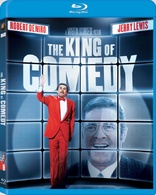
Movie rating
8.1 | / 10 |
Blu-ray rating
| Users | 4.0 | |
| Reviewer | 4.0 | |
| Overall | 4.0 |
Overview
The King of Comedy (1982)
Aspiring comic Rupert Pupkin attempts to achieve success in show business by stalking his idol, a late night talk-show host who craves his own privacy.
Starring: Robert De Niro, Jerry Lewis, Sandra Bernhard, Chuck Low, Shelley HackDirector: Martin Scorsese
| Drama | Uncertain |
| Dark humor | Uncertain |
| Comedy | Uncertain |
Specifications
Video
Video codec: MPEG-4 AVC
Video resolution: 1080p
Aspect ratio: 1.85:1
Original aspect ratio: 1.85:1
Audio
English: DTS-HD Master Audio Mono
French: Dolby Digital Mono
Spanish: Dolby Digital Mono
Italian: DTS-HD Master Audio Mono
Subtitles
English SDH, Italian, Japanese, Spanish
Discs
50GB Blu-ray Disc
Single disc (1 BD)
Playback
Region free
Review
Rating summary
| Movie | 4.0 | |
| Video | 4.0 | |
| Audio | 4.0 | |
| Extras | 3.0 | |
| Overall | 4.0 |
The King of Comedy Blu-ray Movie Review
You laughin' at me?
Reviewed by Jeffrey Kauffman March 19, 2014The 1980s saw Martin Scorsese try—twice, in fact—to break away from his perceived role as a helmsman interested only in overtly dramatic fare. It’s notable that neither of Scorsese’s eighties comedies, King of Comedy and After Hours, has attained the flat out iconic status of some of the director’s other pieces like Raging Bull or Taxi Driver, though both have their adherents, in some cases almost rabidly so. Scorsese’s reputation may still rest largely on his more dramatic films, but as he’s repeatedly proven as recently as with Hugo 3D and The Wolf of Wall Street, he has a flair—albeit an often dark flair—for humor and whimsy. That inherent darkness may be what doomed The King of Comedy with both critics and audiences, as well as its now more obviously prescient examination of a fame obsessed society which in 1983 probably seemed too fanciful to believe. The humor in The King of Comedy isn’t merely dry, it’s positively Saharan, and that, coupled with two focal characters who aren’t exactly warm and fuzzy, makes the film a hard sell. But for those willing to tolerate an intentional level of increasing discomfort and awkwardness, The King of Comedy is one of Scorsese’s most interesting creations, and one that has certainly aged better than might be expected, either in spite of or perhaps even because of changes in the media world. When The King of Comedy debuted, Johnny Carson was still the undisputed master of late night television, and while a host of contenders had attempted to knock him off his perch, people like Joey Bishop and Merv Griffin, no one had been able to even come close. While David Letterman had begun to burnish his (actually early morning) chops on NBC’s Late Night with David Letterman in a companion show to Carson’s iconic The Tonight Show, it would be another ten years before there was any real competition in the late night arena, ironically when The Tonight Show passed to Jay Leno and Letterman himself moved to CBS. Having one king of the late night hill is an integral part of The King of Comedy’s setup, for Jerry Lewis portrays Jerry Langford, a stand-in for Carson whose witching hour variety show is a Tonight Show sized monolith. Langford is idolized by hordes of fans, including a probably well meaning but seriously deluded would be comic named Rupert Pupkin (Robert De Niro). Pupkin’s increasingly desperate attempts to attract Langford’s interest in his supposedly burgeoning comedy career provide the impetus for much of the film’s plot.
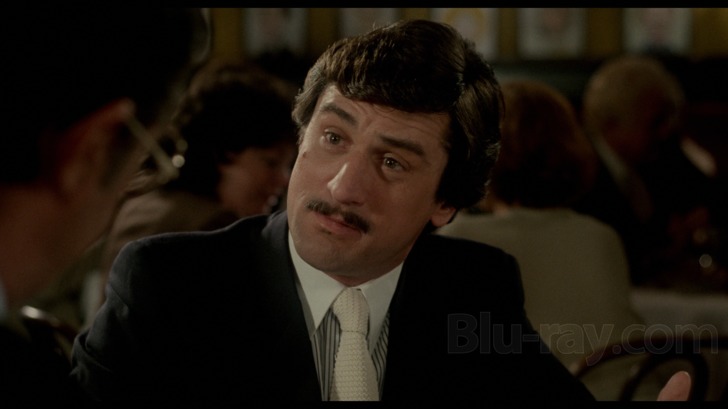
Pupkin may be slightly less dangerous than Travis Bickle in Taxi Driver, but he’s probably no less of a sociopath and narcissist. A gaggle of fans regularly awaits the exit of Langford every evening at the stage door of the studio where he tapes his show, proffering autograph books and screaming for a momentary audience with their idol. When Rupert shows up, it’s obvious he’s a regular at such gatherings, for several others call out to him by name, asking him what his latest autograph “gets” have been. Rupert seems a bit put off by their entreaties, shutting them down with a curt—and obviously false—statement that activities like this don’t comprise his entire life. When Jerry is almost mauled by an especially “enthusiastic” fan named Masha (Sandra Bernhard), Rupert steps in and physically pushes the crowd away from the star, receiving a minor injury to his hand in the process. That plays upon Langford’s conscience enough to actually grant the hapless Pupkin a few minutes in Langford’s limousine, where Rupert informs Langford that he’s a struggling comedian who wants to appear on Langford’s show.
Langford is obviously not very impressed with a guy who has absolutely no professional standing or even any prior gigs to point to, and brushes him off with a cursory “call me”, a too subtle irony for the literal Rupert to comprehend. Rupert starts showing up at Jerry’s midtown offices, repeatedly interacting with a talent coordinator named Cathy Long (Shelley Hack), but getting no closer to Langford himself. Cathy’s probably too polite dismissals of Rupert repeatedly fail to make any impact on the guy, and the film in fact spends some time showing how Rupert’s obsession with Jerry has gotten to the point that he regularly fantasizes about interacting with the star as a peer and perhaps even a superior.
Rupert comes off as a misguided naïf, but he starts to tip over into potentially dangerous territory when, in an attempt to impress a date named Rita (Diahnne Abbott), he actually shows up at Jerry’s palatial mansion and pretends to know Jerry (who is out golfing at the time). Jerry’s butler phones his employer in a panic, and Jerry, almost preternaturally calm, comes back and finally delivers an ego bursting gut punch that Rupert finally seems to understand. Instead of nursing his wounds and retreating into his lonely shell, though, Rupert teams up with Masha to kidnap Jerry in a desperate gambit to finally get Rupert on Langford’s show.
As odd as it may sound, The King of Comedy dances around some of the same themes that would be explored a decade or so later in another largely misunderstood (and even reviled) film, Oliver Stone’s bombastic Natural Born Killers. Both films depict our society’s fascination with fame, a fascination which is often divorced from any real accomplishment to bolster such renown. In 1983 this concept probably seemed outlandish; in 1994 (when Natural Born Killers arrived), probably less so, though Stone’s in your face presentation may have ultimately harmed the potent subject matter as much as it helped. In today’s “fame by lottery” world (as I’ve previously called such sweepstakes as American Idol), this idea seems positively obvious, and therefore The King of Comedy’s central thesis of fame for fame’s sake, no matter what the means or in fact the end, probably resonates more deeply than ever before.
Of course the concomitant plot device of celebrity stalking probably seemed downright absurd in 1983, though the intervening years have shown what a problem it can be (ironically one of the higher profile stalking cases involved David Letterman). What Scorsese and screenwriter Paul D. Zimmerman (an unrepentant film critic who proved that those who “can’t” sometimes do more than merely teach) make clear, however, is that Langford is actually a relatively approachable and accessible celebrity. He walks the streets of Manhattan and interacts with various passersby without much pretense. In this regard, Langford is a far cry from the notoriously reclusive Carson, or even the reportedly prickly Letterman. This general geniality only makes Rupert’s insistence on being paid attention to all the more provocative and, ultimately, disturbing.
The King of Comedy is not an out and out gut busting laugh-fest. Instead, it’s an unsettlingly real feeling character study that has some extremely wry humor sprinkled rather liberally throughout its increasingly odd story. The film is highlighted by some disarming work by De Niro, who makes Pupkin actually weirdly lovable in his own demented way and also by Lewis (who was touted as a likely Best Supporting Actor nominee that year, a prediction that sadly failed to materialize), who underplays Langford very well, bringing some unexpected gravitas to the role. Sandra Bernhard is completely hyperbolic and annoying, seemingly her stock in trade, though at least in this case it seems intrinsically tied to Masha’s obnoxious character.
The King of Comedy Blu-ray Movie, Video Quality 
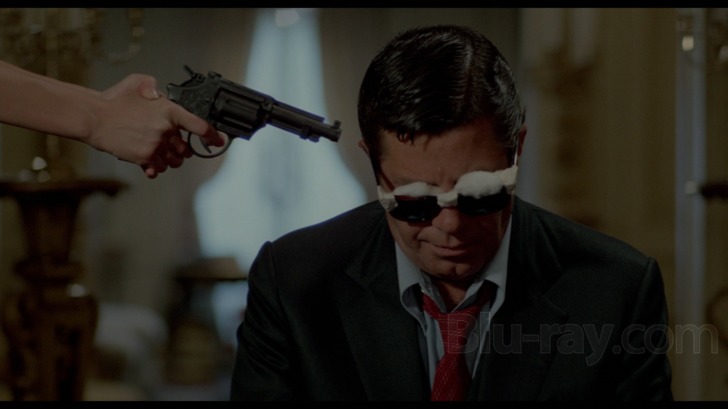
The King of Comedy is presented on Blu-ray courtesy of 20th Century Fox Home Entertainment with an AVC encoded 1080p transfer in 1.85:1. The elements used for this presentation are in great shape, though it's important to realize that Scorsese intentionally utilized lo-fi videotape for the television sequences (see screenshots 5 and 16), which naturally result in a much softer and less detailed look (which in some cases include such anomalies as slight ghosting). Colors look natural, but are not overly suffused. Scorsese and cinematographer Fred Schuler capture some great Manhattan locations, and the outdoor sequences offer excellent detail and at times good depth of field. The general appearance here is somewhat on the soft side, however, especially in many dimly lit interior scenes. Close-ups reveal very good to excellent levels of fine detail, and contrast is nicely dialed in throughout the presentation.
The King of Comedy Blu-ray Movie, Audio Quality 
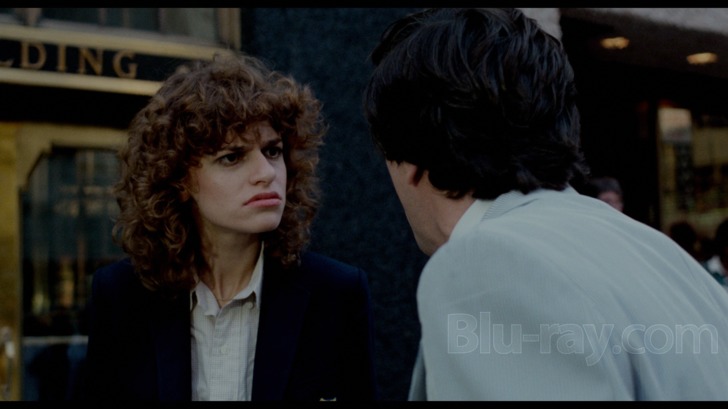
The King of Comedy features a perfectly acceptable lossless DTS-HD Master Audio Mono mix that capably reproduces the film's fairly straightforward sound design. It is notable to hear the difference between that swingin' Jerry Langford Show theme music on the menu screen, where it's presented in LPCM 5.1, and the actual film, where it sounds considerably narrower due to its mono iteration, but for the film's dialogue and occasional cityscape environmental effects, the mono track suffices perfectly well. There's no damage of any kind to cause concern.
The King of Comedy Blu-ray Movie, Special Features and Extras 
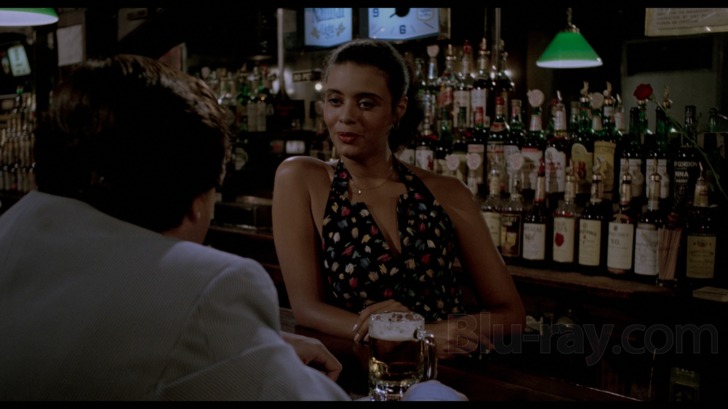
- Deleted and Extended Scenes (480i; 37:59)
- Tribeca Film Festival: A Conversation with Martin Scorsese, Robert De Niro and Jerry Lewis (1080i; 29:50) is an interesting relatively recent Q & A session (it bears a 2013 copyright) that finds the three collaborators reminiscing on the project. Sandra Bernhard shows up via videotape.
- A Shot at the Top: The Making of The King of Comedy (480i; 18:57) is an older featurette which offers some good interviews with the cast and crew.
- Theatrical Trailer (480i; 1:29)
The King of Comedy Blu-ray Movie, Overall Score and Recommendation 

I actually have a soft spot in my heart for both of Scorsese's eighties comedies, and in fact may even like After Hours a tad more than The King of Comedy, due to the fact that I actually worked as a word processor for a long time (if you've seen After Hours, you'll understand that reference). But The King of Comedy has its own very smart observations to make and it remains a decidedly pointed experience, perhaps more so today than it was on its initial release. De Niro and Lewis are wonderful, and while the plot tiptoes around some fairly disturbing subject matter, Scorsese never devolves into snark or derision. This Blu-ray release features excellent video, audio and supplements and comes Highly recommended.
Similar titles
Similar titles you might also like

Birdman
Birdman or (The Unexpected Virtue of Ignorance)
2014

Network
1976

Carnage
2011

Hi, Mom!
1970

The Royal Tenenbaums
2001

Synecdoche, New York
2008

A King in New York
1957

The Apartment 4K
1960

Wiener-Dog
2016

Mean Streets 4K
1973

The Bonfire of the Vanities
1990

Little Miss Sunshine
2006

Listen Up Philip
2014

Do the Right Thing 4K
1989

American Beauty
1999

If....
1968

To Die For
1995

Monsieur Verdoux
1947

The Landlord
1970

Modern Times
1936